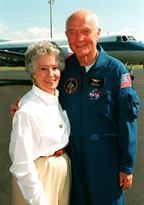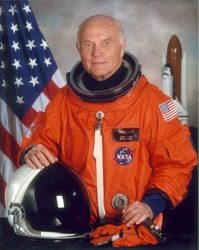 |
I don't remember when I first met my wife, Annie. Our parents were good friends and we practically grew up in the same playpen. We never knew a time when we didn't know each other. But somewhere in my teens, I took a second look at Annie and liked what I saw.
She has always had a great sense of humor; she was a straight-A student and a wonderful musician. She won a scholarship to Julliard, but instead she stayed in Ohio, at Muskingum College, and married me. I admired Annie. She was a very talented person, a true standout. Yet, she had this great difficulty.
 |
| John Glenn, with his wife and hero, Annie Glenn. (Courtesy of NASA) |
Annie was a stutterer. She'd have a hang-up on 85 percent of the words she tried to speak, which was a severe handicap. When we were growing up, I knew Annie for the type of person she was, and all the things you'd be attracted to in a person, except for the stuttering. Through the 62 years we have been married and our childhood together, I have seen her reach out so many times. We can just about guess what the other is thinking, but not everybody saw Annie the way I did; they couldn't get beyond the stuttering to know her for all her talents. In school she never tried out for school plays and was never asked to recite. As Annie got older, everyday tasks and conversations were extremely difficult for her, but she did them with great courage.
For Annie, stuttering meant not being able to take a taxi because she would have to write out the address and give it to the driver because she couldn't get the words out. It would be too embarrassing to try to talk about where she wanted to go. Going to the store is a tremendously difficult and frustrating experience when you can't find what you want and can't ask the clerk because you are too embarrassed of your stutter. The telephone is another devil for a stutterer. Most stutterers just won't call anybody. Annie couldn't just pick up the phone and call a friend to chat, or even 911. I was in the Marine Corps and was overseas while Annie was at home with our two young children. When I went away, we always made sure that there was a neighbor available in case there was an emergency since Annie would probably not be able to use the telephone.
When I was in Guam, Annie brought our two young children out there to visit. She flew on commercial airlines until she got to San Francisco. Traveling across the country with two children in tow is a great difficulty for anyone, but especially for someone with her kind of communication problem. I saw Annie's perseverance and strength through the years and it just made me admire her and love her even more. It takes guts to operate with a disability; I don't know if I would have had the courage to do all the things that Annie did so well.
When Annie was younger, stutterers were generally assumed to have a psychological problem. Therapy based on that theory helped a few people, but it didn't work with Annie. She had been through every type of treatment there was, and they were of very little help to her. It was a tremendous disappointment because she wanted so much to speak normally. Every time she would go through a treatment program or work with a speech therapist it didn't work; with consistent disappointments, she despaired trying again.
Finally, about 20 years ago, we were watching the Today show, and a professor, Ron Webster, was talking about the success of his new theory and treatment for stuttering. I turned to Annie, and said, "You should try this because it's brand new." She agreed, and went down to Webster's three-week course in Roanoke, VA. It literally changed her life.
In her first week, she learned how to speak in slow, short syllables. During the second week, they gradually sped up the rate at which she spoke, working on sounds that are particularly difficult for stutterers. The third week is a continuation of the work learned in the first two weeks. Annie reached a point where she could represent me in speeches, and speak for others with handicaps. She will always have to work on her speech, but with her courage and determination she overcomes the disability every day with phone calls and normal conversation.
Annie inspired a lot of people to get treatment for their disabilities. Through the American Speech and Hearing Association (ASHA), she would meet with people to tell her story and how she stuck with her treatment. ASHA was impressed enough by Annie's accomplishments that they now give an award in her name. The "Annie" honors people who overcome great communication difficulties and achieve distinction by helping others. Each year we try to make it to the award ceremony, and Annie presents the award. One year, Annie presented the award to James Earl Jones. You would never guess in a thousand years that he was a stutterer by watching him in movie roles, but he, too, has learned to overcome his handicap.
Along with others like Jones, the recipients of the "Annie" exemplify the very definition of the word hero. They not only demonstrate tremendous personal strength, but they also choose to use that strength to benefit other people. Despite great difficulties and daily struggles, these individuals don't expect anybody else to take care of them. We tend to think of heroes as being those who are well known, but America is made up of a whole nation of heroes who face problems that are very difficult, and their courage remains largely unsung. Millions of individuals are heroes in their own right. In my book, Annie is one of those heroes.
Page created on 8/11/2014 5:59:28 PM
Last edited 9/27/2018 3:25:00 PM
Copyright 2005 by The MY HERO Project
MY HERO thanks John Glenn for contributing this essay to My Hero: Extraordinary People on the Heroes Who Inspire Them.
Thanks to Free Press for reprint rights of the above material.

In 1962, at the height of the Cold War, when the USA and the USSR were pitted against each other, John Glenn was launched into space, the first American to orbit the Earth. The Berlin Wall had just been erected, and the previous year saw two Russian cosmonauts successfully orbit the Earth, propelling the Russians to the head of the space race. Americans needed a patriotic boost, and NASA's success did just that, with Glenn as the icon of a renewed American pride.Perhaps John Glenn will be most remembered as the hero in a space suit, but he was a strong and honorable figure long before his fame as an astronaut. Growing up in a small town, John learned about the values of hard work, civic duty, and patriotism. Glenn's affinity for flying also began in this small town, with short flights in his father's barnstormer. After the attack on Pearl Harbor, John quit school and enlisted in the Army Air Corps.
A veteran of two wars, Glenn flew more than a hundred combat missions. His military experience put him on the path to a career in aviation, but his sense of honor, hardworking nature, and quick thinking earned him a spot on NASA's first list of astronauts.
In between space missions, Glenn ran for the U.S. Senate, and after a few lost races, was elected Senator of Ohio by an overwhelming majority. Senator Glenn fought to clean up decades of environmental waste left by the nuclear weapons surge during the Cold War. After 24 years of service, John retired from the Senate and spent a few years traveling with Annie, his wife of 63 years. Yet, there are still times when he wishes he were still working on Capitol Hill.
Glenn's support for the US space program has been unwavering and so has his commitment to education and community service. On the twenty-fifth anniversary of the Friendship 7, Glenn remarked, "The exploration of the unknown is nothing less than an expression of America's Spirit." Glenn's outer space exploration came full circle in 1998, when he completed one last mission on the space shuttle Discovery.
To read more about John Glenn,
CLICK HERE